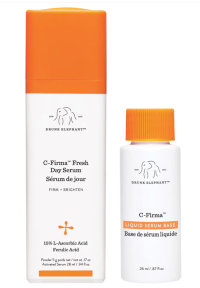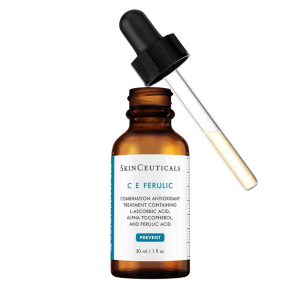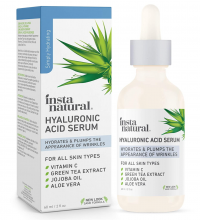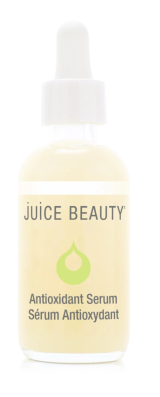Vitamin C, or ascorbic acid, is a potent antioxidant with many health benefits. In addition to being a necessary nutrient for your body, it is a beneficial cosmetic product as well. Supplementing with vitamin C, both orally and topically, can help keep your skin healthy and looking fresh.

Collagen Synthesis
Collagen is a long, strong, flexible protein. It is the major component of the structural matrix that holds your skin together and is responsible for your skin’s firmness and elasticity. When your skin is exposed to damaging agents in the environment, such as pollutants and UV radiation from sunlight, your collagen matrix gradually breaks down. Loss of skin integrity from collagen degradation causes wrinkles and flabby skin. Your body can produce fresh collagen matrix in order to repair damaged skin. Vitamin C, or ascorbic acid, is a coenzyme for collagen synthesis, meaning that enzymes need vitamin C in order to make new collagen proteins. Vitamin C also reduces the levels of metalloproteases, a type of protein that breaks down collagen.1 The net result of vitamin C supplementation, either orally or in a topical skin care product, is more collagen and firmer, more elastic skin.

Antioxidant Activity
One of the major causes of aging is oxidative damage. During energy production in your cells, reactive oxygen species are produced. These are highly volatile compounds that can damage DNA, proteins, lipids, and other molecules in your cells. The long-term effects of these oxygen radicals are aging skin and organs, and sometimes even the development of cancer.
Vitamin C is very efficient at neutralizing reactive oxygen species. Supplementation with vitamin C can reduce reactive oxygen species and molecular markers of aging. It can also improve skin elasticity and reduce wrinkles.2

Protects Against Sunburn, Photoaging, and Skin Cancer
UV radiation has several damaging effects on your skin. The most immediate and noticeable is sunburn when damaged and dead skin cells cause significant inflammation. UV damage to skin cell DNA can also cause skin cancer to develop. Over time, damage to DNA, collagen, and other skin structures causes skin sagging and wrinkling.
The anti-inflammatory and antioxidant properties of vitamin C counter the effects of light-caused damage in your skin. Supplementing orally with vitamin C in combination with vitamin E helps reduce inflammation, pain, and redness from sunburn after it happens and can help reduce the likelihood of happening in the first place.3 Topical vitamin C can also help reduce the risk of sunburn. Moisturizing creams containing 3-30% vitamin C, when applied daily, can also help reduce the effects of photoaging, including wrinkles like crow’s feet, and hyperpigmentation (sun spots).4,5 Some research suggests vitamin C can even help protect against skin cancer.6


Promotes Skin Hydration
One function of the collagen matrix in the skin is retaining moisture. Increased collagen production and reduced degradation help build and maintain this protective barrier. Supplementing with vitamin C can increase skin hydration and reduce moisture loss.2 It is especially effective in combination with other skin care ingredients, such as zinc and hyaluronic acid.7 On top of being generally healthier, hydrated skin looks more taut and smooth.

Top Vitamin C Supplements
Below are some of the top vitamin c serums on the market with sufficient potency and efficacy:
[1] Maione-Silva L, de Castro EG, Nascimento TL, Cintra ER, Moreira LC, Cintra BAS, Valadares MC, Lima EM. 2019. “Ascorbic acid encapsulated into negatively charged liposomes exhibits increased skin permeation, retention and enhances collagen synthesis by fibroblasts.” Jan 24; 9(1):522. https://www.ncbi.nlm.nih.gov/pubmed/30679479
[2] Jeong JH, Kim MB, Kim C, Hwang JK. 2017. “Inhibitory effect of vitamin C on intrinsic aging in human dermal fibroblasts and hairless mice.” Food Sci Biotechnol. Nov 22; 27(2):555-564. https://www.ncbi.nlm.nih.gov/pubmed/302637
[3] Eberlein-König B, Placzek M, Przybilla B. 1998. “Protective effect against sunburn of combined systemic ascorbic acid (vitamin C) and d-alpha-tocopherol (vitamin E). J Am Acad Dermatol. Jan; 38(1):45-48. https://www.ncbi.nlm.nih.gov/pubmed/9448204?dopt=Abstract
[4] Dreher F, Denig N, Gabard B, Schwindt DA, Maibach HI. 1999. “Effect of topical antioxidants of UV-induced erythema formation when administered after exposure.” Dermatology. 198(1):52-55. https://www.ncbi.nlm.nih.gov/pubmed/10026402?dopt=Abstract
[5] Raschke T, Koop U, Düsing HJ, Filbry A, Sauermann K, Jaspers S, Wenck H, Wittern KP. 2004. “Topical activity of ascorbic acid: from in vitro optimization to in vivo efficacy.” Skin Pharmacol Physiol. Jul-Aug; 17(4):200-206. https://www.ncbi.nlm.nih.gov/pubmed/15258452?dopt=Abstract
[6] Gęgotek A, Ambrożewicz E, Jastrząb A, Jarocka-Karpowicz I, Skrzydlewska E. 2019. “Rutin and ascorbic acid cooperation in antioxidant and antiapoptotic effect on human skin keratinocytes and fibroblasts exposed to UVA and UVB radiation.” Arch Dermatol Res. Apr; 311(3):203-219. https://www.ncbi.nlm.nih.gov/pubmed/30783768
[7] Göllner I, Voss W, von Hehn U, Kammerer S. 2017. “Ingestion of an Oral Hyaluronan Solution Improves Skin Hydration, Wrinkle Reduction, Elasticity, and Skin Roughness: Results of a Clinical Study.” J Evid Based Complementary Altern Med. Oct; 22(4):816-823. https://www.ncbi.nlm.nih.gov/pubmed/29228816
Search the blog
Article Categories
- All Articles (95)
- Rating Charts (1)
- Beauty & Skincare (17)
- FAQ (0)
- Hair Care (9)
- Health & Wellness (12)
- Anti-Aging (4)
- Kid's Health (0)
- Makeup (2)
- Men's Health (2)
- Oral Care (3)
- Sunscreen (7)
- Skin Tools & Treatments (10)
- Supplements (26)
- Videos (0)










